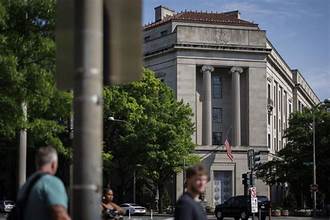DOJ to Pay Whistleblowers for Corporate Crime Tips

The Justice Department will start paying non-culpable whistleblowers who deliver tips on financial misconduct, overseas bribery, and other corporate fraud.
The new program formalizes an approach that’s been used occasionally in the past to reward people for providing information resulting in criminal or civil forfeitures, and will launch later this year, Deputy Attorney General Lisa Monaco said at a legal conference Thursday.
Similar financial incentives for whistleblowers offered by the Securities and Exchange Commission and other agencies have proven effective at coaxing tipsters and disgorging ill-gotten gains from white-collar criminals, Monaco said in remarks prepared for delivery. But the existing programs “are limited in scope,” and “don’t address the full range of corporate and financial misconduct that the department prosecutes.”
“The premise is simple: If an individual helps DOJ discover significant corporate or financial misconduct—otherwise unknown to us—then the individual could qualify to receive a portion of the resulting forfeiture,” Monaco said at the American Bar Association’s white collar crime conference in San Francisco.
The initiative marks the latest Biden administration white-collar enforcement policy shift designed to entice more self-reporting of corporate wrongdoing. To date, the administration has focused on encouraging corporations to hand over evidence they uncover of internal misconduct while the new effort targets individual employees who learn about their company’s fraud.
DOJ will be building a pilot program over the next 90 days with plans for it to take effect later this year, Monaco added.
The whistleblower programs at the SEC and Commodity Futures Trading Commission have been critical in attracting thousands of tips since they launched under the Dodd-Frank Act, Monaco said.
However, the number of SEC tipsters who were rewarded money plummeted in fiscal 2023 and a 2022 Bloomberg Law investigation reported that the SEC program often ignores its own rules, shields much of its work from the public, and has been a financial boon for law firms that hired former agency officials.
Many of the specifics on how DOJ’s version will function remain unclear, and require additional development. Monaco said it will be reserved for individuals who didn’t play a role in the crime, submitted accurate information not already known to government, and when there aren’t other federal financial incentives for whistleblowers, such as DOJ’s false claims qui tam system. DOJ will only provide payments after victims have been compensated.
The department may also need to address concerns from within its own ranks.
“One unintended consequence of a DOJ authorized whistleblower program paying witnesses is that it creates a whole new area for defendants to demand discovery of exculpatory information, and to cross-examine witnesses at trial on their financial bias,” said Henry Van Dyck, a former DOJ criminal fraud supervisor who now co-chairs the white collar practice at Faegre Drinker. “The program may well lead to an increase in corporate criminal investigations, but I would be surprised if line prosecutors are universally thrilled by the prospect of this new discovery headache.”
The new model appears to tap into an authority established in 1984 for the attorney general to award those providing information leading to criminal and civil forfeitures of criminals’ assets. That led to about $10.6 million in overall payments in each of the past few years, according to a department budget document.
But DOJ has never before used this authority “as part of a targeted program,” Monaco said.
DOJ is particularly interested in luring tipsters who can provide information about misconduct targeting the US financial system, international bribery schemes under the Foreign Corrupt Practice Act, a recently-enacted statute criminalizing when foreign officials take bribes, and other corruption.
“Maybe you’ve got a client at a private equity firm, and she discovers the CFO is forging underlying loan documents,” Monaco said. “If your client reports it, a portion of the recovery could be hers.”
The deputy AG also reserved a portion of her speech to reinforcing the department’s recent efforts around combating threats from AI. Monaco re-upped her recent directive for prosecutors to consider recommending harsher sentences for criminals who’ve abused AI to accelerate their offenses and said Thursday that prosecutors will also consider how companies mitigate AI risks when evaluating their compliance programs.



